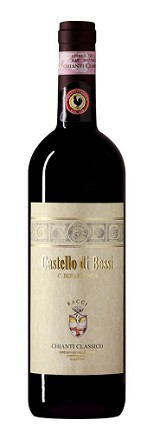| The Castello di Bossi is located in the commune of Castelnuovo Berardenga, on the road that leaves the old Chiantigiana road, at Pianella, and ascends to Brolio amidst evergreen forests and long rows of vines. With its centuries-old trees, its fossil beds, and richly varied native vegetation, this unique spot has always aroused curiosity, even in remote times, and experts have studied its characteristics. The name Bossi would seem to derive from the money chest which the Roman army would carry to its encampments to pay the soldiers; the word probably refers to the boxwood, a rare and prized wood at that time, from which the chest was built. Inscriptions dating from the 1st and 2nd centuries AD, discovered in an ancient wall of the canonry in San Marcellino, indicate that this area was the site of a Roman settlement. The first reliable evidence of families dwelling in the Bossi area dates to the 9th century, when a noble family, the dei Berardenghi, settled there. Winigi and his wife Richilda enjoyed a lengthy rule over the territories they owned; they then decided to withdraw into private life and donated to religious institutions their fiefs and properties. They kept, however, the properties which today surround the castle. Bossi was a specific locale and was mentioned as such in a 1099 donation deed by Azzo di Rustico to the monastery of Fontebona. Bossi?s church, dedicated to Sant?Andrea, was built later, possibly around 1200, to afford improved spiritual care to the inhabitants of the growing village. Contemporary documents reveal that vineyards already existed at that time, since a portion of rents and leases was paid in kind, wine being cited among the listed products. In the war between Florenceand Siena, Bossi was a bordering area; only after the battle of Montaperti did economic activities recover their normal level. This was made possible by construction of new roads and facilities or improving the safety of existing ones, all aimed at re-establishing commercial links. Existing castles were renovated, but Bossi?s tower was not affected. When Castelnuovo Berardenga was founded, in 1346, Bossi was included in its jurisdiction;in 1383 Bossi was summoned to its defence against mercenaries in the pay of Florence. In the same period, the territory was acquired by the Pacidi family, who were originally from Radi but now lived in Siena. The demolition of the old tower and the construction of the palazzo of Bossi can be dated between the late 14th and early 15th centuries. But the castle was damaged even in the late 15th century by the Florentines, who failed to capture Berardenga but proceeded to destroy numerous outlying districts. The accession of the Medicis brought a halt to the inter-city warfare and gave local populations the chance to begin normal civic life again. This juncture proved favourable for renewed winemaking activities. The castle property gained two new owners, the Ugurgeri and Ospedale di Santa Maria della Scala ofSiena, both connected to the Placidi family. Under the rule of Leopold II, Granduke of Tuscany, the entire region enjoyed a period of prosperity. His policies made it a politically liberal state, and commercial, cultural, and civic life flourished. Giovanni Battista Vivarelli, heir to Isabella, the last of the Ugurgeri, transferred the Castel estate to the Sienese jurist Giuseppe Giuggioli, whose family retained the property up until World War II, when it was purchased by the Piccolomini family of Siena. The abolition of the mezzadria, or sharecropping, system, led to a population shift away from the country and to a consequent crisis in the agricultural sector. Bossi, too, underwent a slow decline until it was acquired by the present owners, the Bacci family. These forward-looking proprietors introduced modern production methods and better management practices, leading to a rebirth for the Castello. |







